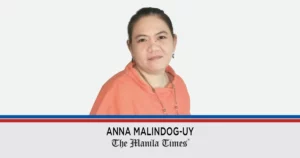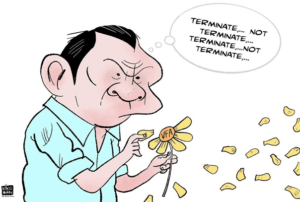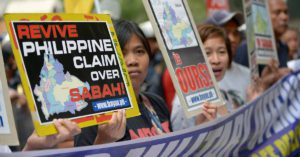THE recent controversial issue of the demand of the United States for the Philippines to temporarily host around 50,000 Afghan “refugees” while their US immigration applications, particularly the special immigrant visas (SIV), are being processed has created a buzz in the Philippines to the point that the Philippine Senate Committee on Foreign Affairs, chaired by Sen. Maria Imelda “Imee” Marcos, the sister of the incumbent President Ferdinand Marcos Jr., was launched last Friday, June 16, to look into the matter and shed light on the request from the superpower.
To note, Senator Marcos filed a resolution seeking an inquiry into the plan and questioned the Presidential Management Staff’s (PMS’s) decision to keep the “technical coordination meeting” results from the public.
This issue has generated different opinions and sentiments among ordinary Filipinos and well-known political figures in the Philippines. Two of the most prominent political icons in this day and age in Philippine politics who have expressed opposition to the entry of Afghan “refugees” to the Philippines at the bidding of the US are Vice President Sara Duterte and former president Rodrigo Duterte.
Opposing sentiments
Vice President Duterte, also the concurrent Education secretary, has opposed the US proposal of making the Philippines a “temporary haven” for Afghans who worked and were backed up primarily by the US, of whom some of them worked as well for foreign missions in Afghanistan within the almost two decades of the US military invasion, intervention and operations in Afghanistan and its allies against the Taliban, which has returned to power in August 2021 after the US withdrew all its forces from Afghanistan on May 2021. The vice president said the US scheme poses a threat to Philippine security and sovereignty. To note, Education Undersecretary Michael Wesley Poa quoted a position paper, signed by Vice President Duterte, stating, “It seems that the vetting process may be done by the US. We think it is interference to our exclusive determination of who can enter our country.”
To note, the United States Armed Forces completed their withdrawal from Afghanistan on Aug. 30, 2021, marking the end of the 2001-2021 war in Afghanistan, the US military invasion of Afghanistan.
On the other hand, in his “Gikan sa Masa, Para sa Masa” (“From the Masses for the Masses”) talk show aired on SMNI on June 19, 2023, former president Duterte expressed his opposition to the possibility of the Philippines hosting around 50,000 Afghans as per the bidding and demands of the United States. He beseeched the questions of whether, in any case, this issue is a matter of humanitarian action or a security threat, and if, in any case, the Philippine government is compelled to accept these Afghan “refugees” within Constitutional grounds.
As far as the former president is concerned about whether the government is really compelled to accept these Afghan “refugees” on the pretext of US demands, the answer is no. He said, “There could never be a compulsion for any member-state of the United Nations that can be compelled to accept foreign nationals whether as refugees or in whatever status. It is always within the discretion, the power of discretion of the receiving state, to accept or refuse entry of other people other than its own nationals. And, I would say that, no, we cannot be compelled. On the issue of whether it is within the bounds of the Constitution, I said that as a member-state of the UN, I would say that it is within the bounds, but our acceptance of nationals other than Filipinos must be based on valid and justifiable grounds.”
In the June 12, 2023 episode of “Gikan sa Masa, Para sa Masa,” Duterte expressed his opinion that, as an act of humanitarian interest, the Philippines may accept refugees from other countries. However, it must be based on valid grounds. The former president also argued that the Philippines seems not to be involved in the vetting or evaluation process of accepting these Afghans on Philippine soil.
The former president argued: “There are no guidelines given out about how they are being processed and their applications pursued and to what extent did our country participate in the vetting of these foreign Afghan nationals to come to the shores of the country. Hence, how are we supposed to secure the interests of our country if we are accepting foreigners that we do not know? Just because they were working for the US does not mean that it is a guarantee that we will be comfortable accepting them. We have no guarantee that they are or were members of the radicals in Afghanistan who are now running the government of Afghanistan?”
Duterte also expressed that he does not have confidence in the Americans and that relying on the US alone for the vetting process of these Afghan “refugees” to enter the Philippine borders is not good enough. In fact, he said it was pretty dangerous. He pronounced: “I do not trust the Americans. I really do not trust them.”
The former president fundamentally wants to know how the vetting process is done or will be done if it includes the Philippines, given that it is the so-called temporary host country, and if indeed these Afghans are really above suspicion vis-a-vis the acts and threats of terrorism.
In a way, Duterte is saying that in the vetting process, if, in any case, the current administration will bend to the will of Uncle Sam by making the Philippines a temporary haven for Afghan “refugees” who seek to migrate to the US, he suggests having independent government personnel of the Republic of the Philippines, vetting alongside Americans or conducting a separate independent vetting process. He said: “It cannot be America who is interested to protect the US. America is good for what is good for America. America is bad if you disagree with America.”
Duterte argued further that the problem is that these Afghans being brokered by the US to enter the country’s borders and stay temporarily come from a country that is not only heavily burdened by terrorism but also its present and newly installed government, the Taliban, is considered by the US and the Philippines as a terrorist organization.
As part of his concluding remarks on this issue in his TV program, Duterte called on the men and women of the Armed Forces of the Philippines (AFP), saying, “The military should be the one to know this. It is very important that our military must have a say in this. The military of the government of the Republic of the Philippines has that sworn sacred duty to protect our country, and I demand, as a Filipino citizen, I love our country the same way as you do. I demand that you do the utmost to protect the country. In that sense, I said, the greater rests on the shoulders of the military. I must say that if things go wrong, it would be the military who will be answerable to the people of the Republic of the Philippines. Simple as that.”
Conclusion
In retrospect, as a Filipino and concerned citizen, I share the sentiments of both Dutertes — the former president and the current vice president — that allowing Afghans, who are not even technically refugees, is not just an issue of economics or finance for the Philippines. Instead, it is more a matter of security that may compromise the territorial integrity and sovereignty of the Philippines. The impending influx of US-backed Afghans, albeit former US workers, in the Philippines, some of whom are alleged to be US “spies or operatives,” could be a considerable potential compromising threat to the security and sovereignty of the Philippines.
In this regard, we call on the incumbent President Marcos Jr. to exercise extreme due diligence, prudence, and judiciousness on this matter and to put the national interests of the country and the Filipino people above all else over the interests of a superpower.
Source: The Manila Times
https://www.manilatimes.net/2023/06/22/opinion/columns/are-there-dangers-to-the-demand-of-uncle-sam-for-the-philippines-to-be-a-temporary-haven-for-us-backed-afghan-refugees/1897257



